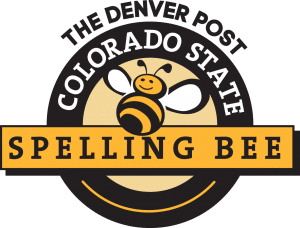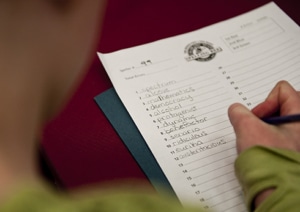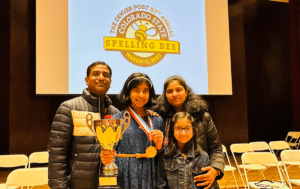DCPA NEWS CENTER
Enjoy the best stories and perspectives from the theatre world today.
Enjoy the best stories and perspectives from the theatre world today.
Have you ever thought about spelling words like dowdy, Shetland, or goober? In order to win The Denver Post‘s 83rd Annual Colorado State Spelling Bee, these were just a few of the shorter idioms contestants ticked out. Longer words included splenetic, portentous, and cornucopia. And some words weren’t even recognized by Microsoft Word’s spell check, yet the kids perfectly worked out lithophone, umpirage, cambio, and churchianity.
The spelling bee took place on Saturday, March 11, inside the echoing auditorium in Sturm Hall on the Denver University campus. Inside the room it was almost silent, despite the stage laden with 24 kids from grades 3rd to 8th from around the state, and their friends and families seated around them.
Madhvi Chittoor, a 7th grader from North Arvada Middle School stepped up to one of the two microphones on stage, the taller one to best to match her height.
Charley Samson, the official spelling bee pronouncer, spoke, cutting the stillness.
“Spell rugby, a noun meaning a form of football, played between two teams of 15 members each…rugby,” he said over the microphone.
Chittoor paused, “Rugby, R-U-G-B-Y, rugby.” She nailed it and went on to do another round.
When Aditi Muthukumar, a 7th grader from Hulstrom Options K-8 School, walked up to the microphone she got the word failure.
“Failure, F-A-I-L-U-R-E, failure,” she said, not failing at all and instead sitting down and waiting for the next round.
Of these 24 kids, only one could win and go onto the 2023 Scripps National Spelling Bee. The words given ranged from seemingly easy terms such as bulbous, heist, and gruel, to more difficult choices including castigate, abominable, and Kodak. The last word tripped up Shruti Rajan, a 5th grader from Aspen Crossing Elementary School, who probably had never thought of the outdated brand, let alone as a verb meaning to go take pictures with a Kodak camera. But, any word is game when it comes to the spelling bee, and the possibilities ranged from religious practices to obscure foods to fictional characters and so much more.
For Vikram Raju, an 8th grader from Aurora Quest K-8, this competition would be the last chance he had to win state and go on to take first place in the Scripps National Spelling Bee. He almost did it last year, earning second place to Harini Logan, a 14-year-old from San Antonio, Texas, after a historic 90-second spelling showdown, the first ever like it.

Photo by Dennis Schroeder for The Denver Post
To prepare for the spelling bee, Raju researches and memorizes the words provided by the national spelling bee, as well as concentrates on learning hundreds of thousands of root words. He’s been studying and practicing spelling seriously since the 3rd grade and started prepping on the national level in sixth grade.
“From an early age I was very interested in picking up phonics and specific patterns with languages, and my parents saw this and steered me toward spelling,” said Raju. “The first really hard word I learned to spell somewhere in 3rd grade, it blew my mind, was cholecystokinin.”
Back then, he said, the 15-letter word seemed super long, but the more he learned about spelling and how words came together, it made more sense. Now, he can belt off the longest word found in the dictionary, pneumonoultramicroscopicsilicovolcanoconiosis, which he said he already has done at least 100 times this school year.
“Some of my favorite words, they are like a puzzle and you can put them together,” said Raju, adding obscure words also please, his all-time favorite being houyhnhnms, the fictional name of a race of intelligent horses in Jonathan Swift’s book, Gulliver’s Travels. Through spelling, he added, “you are getting exposed to all these different languages from all around the world as far away as India or China, it’s pretty exciting.”
The main spelling bee words come from a list provided by the Scripps National Spelling Bee. The types vary, some will make you hungry, like truffle, tempura, haupia, filbert, and Brandywine, an heirloom tomato. Fairytale-like names also were put to the test, with kids magically spelling Cinderella, wolfsbane, Cassandra, and pendragon. Plant phrases appeared popular too, and tensions grew as the contestants seeded the letters to spell terrarium, hydroponic, and succulent.

2023 Colorado State Spelling Bee Champion Aditi Muthukumar. Photo courtesy of Adams 12 Five Star Schools
Just as every kid can’t be a winner, neither can ever word get spelled correctly. Contestants dropped to bravado, nidicolous, hesped, and thoroughbred. Some words needed looking up, such as the instrument xilogolofi, the ancient Indian script called Devanagari, and wahine, a young, female surfer. By round 32, the last two kids standing were spelling words such as barophilic, chandelle, adzes, and mythomania.
There are no limits to how many words they have to spell, though Carol Cline, the Colorado State Spelling Bee event director, noted this was one of the longest state spelling bees they had witnessed. Four hours in, the kids had spelled over 40 words. Next came glyphosate, paloverde, glima, and foraminifera. By the time the spelling bee was up to round 52 close to five hours had passed. Then came the word ametropia.
“Ametropia,” said Raju. “A-M-M-E-T-R-O-P-I-A, ametropia.”
He missed the word by one letter. This gave, that aforementioned 7th grader who hadn’t faced failure, a chance to win. At round 53 she was directed to spell hylozoism, defined as “a doctrine held especially by early Greek philosophers that all matter has life.”
“Hylozoism, H-Y-L-O-Z-O-I-S-M, hylozoism,” she confidently belted out, solidifying her victory in the The Denver Post‘s 83rd Annual Colorado State Spelling Bee.
For Raju, who got second place, the loss hit him hard. After 8th grade the kids age out of the competition, so the spelling bee was his last shot at going to nationals again. Still, his family legacy can live on through his brother, Vedanth Raju, a 5th grader who competed with his sibling and Muthukumar, making it to the final five.
As for the new queen bee, Muthukumar will go on to the 95th Scripps National Spelling Bee in Washington D.C. right after Memorial Day, perhaps taking home the ultimate award and victory, V-I-C-T-O-R-Y, victory.
